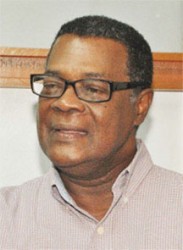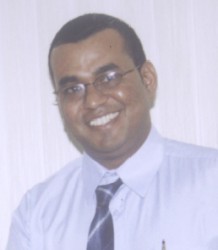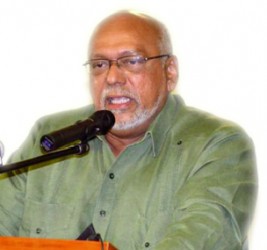With world market prices for gold now in continual decline for most of this year, the local mining industry is challenging itself to raise production levels to ensure that increased volumes compensate for continually falling prices.
Stabroek Business learnt earlier this week that gold production for the first six months of 2013 had already topped 300,000 ounces against the backdrop of a target of 460,000 ounces for the entire year.

Guyana Gold and Diamond Miners Association (GGDMA) senior official Colin Sparman told this newspaper that the effort of the miners was put into perspective by the fact that just a few years ago the industry’s record overall production for a single year was 300,000 ounces.
Falling prices appear to have generated an enhanced determination in the mining community to top previous records this year and Sparman told Stabroek Business that there have been no obvious signs that declining prices had resulted in a loss of confidence in the sector. Stabroek Business has learnt that this year the number of registered dredges in the gold mining sector had increased by more than 1,000 and that there could be in excess of 100 unregistered dredges mining gold in the interior.
Meanwhile, Sparman told Stabroek Business that the GGDMA had noted “some significant attitudinal shifts in miner behaviour arising out of increased gold prices. “There have been a number of cases in which we have detected significantly improved management practices. Particularly, we have noted enhanced scrutiny of operating costs including wages costs. Some mining operations have actually gone to considerable lengths to effect fuel
consumption” savings, Sparman said. He added that while the industry remained reasonably confident of its viability with a world market price of even US$1,000 an ounce, falling prices had meant that no one was any longer taking anything for granted.

The gold-mining industry has turned to government in search of concessions to offset falling gold prices and on Wednesday a GGDMA delegation led by Association President Patrick Harding and including Sparman met with a team of government officials led by President Donald Ramotar and including Natural Resources Minister, Robert Persaud and Finance Minister, Ashni Singh.

Stabroek Business had learnt several weeks ago that the sector was likely to ask government for tax concessions on fuel. On Wednesday afternoon Sparman told this newspaper that he was uncertain as to whether government would grant such a concession but added that the miners were prepared to put on the table what he said was perhaps “a more viable proposal” of the industry importing its own fuel. Official approval permitting, he said that Venezuela, Trinidad and Tobago and Curacao were three possible sources from which fuel could be imported. Sparman said that the industry was entirely prepared to have such fuel imports meet the conditionalities set by the Guyana National Energy Authority (GNEA) and come under the broader scrutiny of the Guyana Revenue Authority (GRA).
The mining community is also seeking the reduction of excise taxes on “double cab vehicles” a common form of transport among major mining operations. Sparman said that the issue that had arisen during the discussions with government had to do with whether or not such vehicles might not be considered luxury vehicles. He said, however, the preference for the double cab vehicles had to do with safety considerations since the police customarily frown on miners being transported in open-back vehicles. He said that any concession on the importation of such vehicles was likely to be tied to applicants’ production levels.
Other issues on the agenda for the miners’ meeting with the President included official permission for the retention of foreign currency accounts from gold sales and crime in the country’s gold-mining regions.
Meanwhile, Sparman told Stabroek Business that the obvious efforts by some miners to impose some measure of self-regulation in response to stricter environmental laws notwithstanding, high levels of transgression persist. “The limitations here include the continued inability of the Guyana Geology and Mines Commission to improve its policing system and what continues to be inducements offered to persons to turn their backs on transgressions. I can tell you that the issue of inducements was on the agenda for our meeting with the President,” Sparman said.




